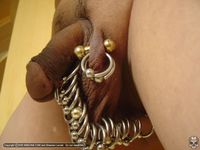Scrotal Piercing
Contents |
Introduction
Scrotal piercings through the skin of the scrotum can be done in practically any gauge or jewelry configuration. Multiple configurartions for scrotal piercings are common including the Hafada and Scrotal Ladder.
Placement
Scrotum piercings may be placed in a variety of configurations and gauges. The most common scrotum piercings are done horizontally at a minimum of 12 gauge but much larger gauges are also possible and fairly common. Scrotum piercings may also be performed in a vertical fashion. Although the vertical placement is uncommon, they have been done successfully with straight and curved barbells. Scrotum piercings done in a vertical fashion tend to see more change in jewelry slack depending on the expansion and contraction of the Scrotum.
Procedure
All three of the below methods should begin with proper jewelry selection for the style of scrotum piercing to be performed. After jewelry selection, the scrotum should be cleaned using a surgical scrub or similar. At this point it is also common to clean the penis to prevent contamination issues due to subsequent contact and handling issues. After cleaning jewelry placement should be marked with a single-use marking instrument.
Clamp-and-Pierce
Probably still the most common method used is the clamp-and-pierce method. After cleaning and marking of the area the scrotum is clamped to hold the tissue in place and make for ease of handling and piercing. With the clamps on, the needle is pushed through the scrotum and the jewelry is subsequently pushed through the piercing behind the needle. Removal of the clamps between piercing and jewelry transfer is optional and definitely depends on the jewelry being used for the piercing. After the jewelry is in, the piercing procedure is typically done unless bandaging is needed to prevent spotting of clothing.
Freehand Method
As opposed to the clamp-and-pierce method, no clamps are used for this procedure. Due to the tissue consistency and ease of handling most areas of the scrotum, the freehand method is also very common among piercers for scrotum piercings. After cleaning and marking, the tissue is held firmly, the marks are aligned, and the needle is pushed through the tissue. Once the needle is through the scrotum the jewelry is transferred into the piercing in a normal fashion.
Scalpelling Method
The scalpelling method is viable for large gauge scrotum piercings. Unlike the previously mentioned methods a scalpel is used instead of a piercing needle. Scalpelling can be performed either freehand or with clamps. As with many large gauge piercings, care should be taken to choose an appropriate piece of jewelry for healing. As opposed to smaller piercings, with larger gauges weight can be an issue and is typically handled by using materials such as titanium with a much lighter weight than steel. Scalpelled piercings should be left to an experienced practitioner.
Healing and aftercare
Healing and aftercare should typically be handled by the person performing the piercing as various methods for healing piercings exist. It is often best to follow the instructions of the person doing the piercing so that they know what was done should a problem arise. This is also why it is important to pick a good artist when receiving work. Scrotum piercings may take anywhere from 3 to 9 months to heal, this will vary from person to person depending on the gauge of the piercing, location, etc.
Care should be taken when healing scrotum piercings as it is possible for serious complications to arise. Infections in the scrotal tissue can become serious in a short amount of time due to the anatomy of the area. In addition, should a Scrotal Infection occur there is potential for a serious and systematic spreading of infection into the abdomen which can be extremely dangerous. A scrotum piercing should not breech into the inner scrotum and care must be taken not to do so when the piercing is performed.
During healing of scrotum piercings the body will be more susceptible to contraction of STDs and other bacteria from a sexual partner's body. The best bet to avoid infection is to allow for the piercings to heal before resuming sexual activities. However, this not being "practical" for many people it is at least advisable to shower and clean the area immediately after any sexual encounter for the duration of the healing period.
Long term health issues
Scrotum piercings do not tend to have any negative long term health issues. However, depending on jewelry and placement care should be taken during certain activities such as bicycling, martial arts, etc. to avoid pulling on the jewelry which can be quite uncomfortable. Care should also be taken with the type of undergarment worn when dealing with genital piercings. Loose strings can often catch on jewelry and make for a rather unpleasant experience.
Migration is uncommon in scrotum piercings unless the piercing was done too shallow or with too small of a jewelry size.
As for the sexual effects of scrotum piercings, scrotum piercings tend to be more of a placebo-erotic piercing as they offer no notable stimulation to either partner.
Jewelry
As stated above, scrotum piercings may be done with a wide range of jewelry. Typically the piercing should be at least 12 gauge. Horizontal piercings are typically done with barbells, captive-bead-rings, curved barbells, or circular barbells. Vertical piercings are typically done with barbells or curved barbells, for this type of piercing captive-bead-rings and circular barbells should be avoided. Larger gauge piercings should start with whatever jewelry will most reduce weight and subsequent problems with healing, this often involves the use of titanium or other light-weight jewelry.
